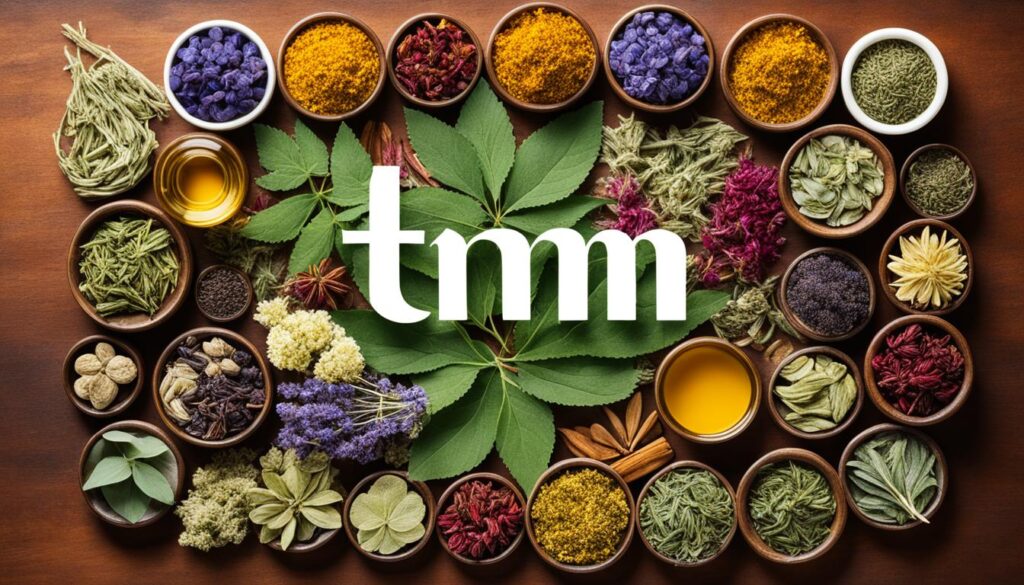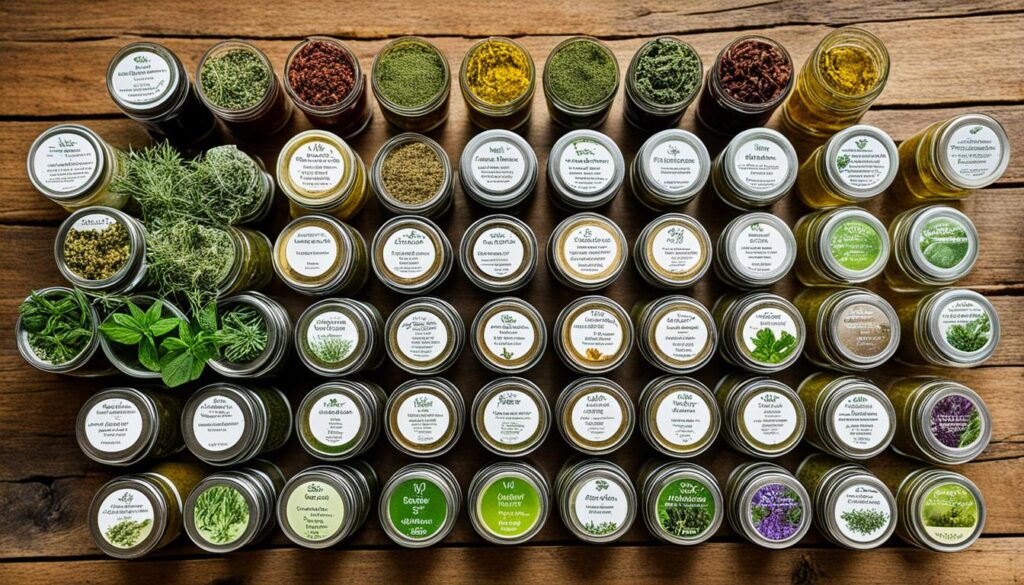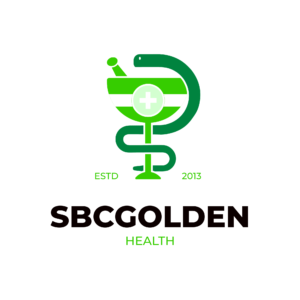Did you know that herbal medicine has been used for centuries as a form of natural healing? It offers a holistic approach to health, focusing on the mind, body, and the environment. But here’s the surprising part: herbal medicine is not just a thing of the past. It is still highly valued today for its numerous benefits, providing natural remedies and promoting overall wellness. Let’s dive into the world of herbal medicine and uncover the power of plant-based healing.
Key Takeaways:
- Herbal medicine has a rich history and is still widely practiced today.
- It offers a holistic approach to health, targeting the mind, body, and environment.
- Natural remedies derived from plants promote overall wellness.
- Herbal medicine harnesses the power of nature to support the body’s healing processes.
- Exploring the benefits of herbal medicine can lead to a deeper understanding of plant-based healing.
The Long-Standing Tradition of Herbal Medicine
Herbal medicine has a rich history deeply embedded in various cultures and traditions. It encompasses a holistic philosophy that treats the individual as a whole, taking into account their physical, emotional, and spiritual well-being. This approach recognizes the interconnectedness of all parts of the body and seeks to address the underlying causes of illness rather than just managing symptoms. Herbal medicine holds cultural significance in traditional medicinal systems around the world, from Ayurveda in India to Traditional Chinese Medicine (TCM) in China.
Understanding the Holistic Philosophy Behind Herbalism
The practice of herbal medicine is grounded in a holistic philosophy that emphasizes the interplay between the mind, body, and environment. Herbalists view the body as a complex ecosystem, seeking to restore balance and harmony by supporting the body’s natural healing processes. Rather than targeting specific symptoms, herbal remedies aim to address the root causes of illness. By taking into account the physical, emotional, and spiritual aspects of an individual, herbal medicine offers a comprehensive approach to health and wellness.
Cultural Significance in Various Traditional Medicinal Systems
Herbal medicine plays a significant role in various traditional medicinal systems across different cultures. In Ayurveda, the ancient Indian medical system, herbal remedies are fundamental in promoting balance and vitality. Traditional Chinese Medicine (TCM), with its deep historical roots, utilizes herbal therapy as a cornerstone of treatment. The cultural significance of herbal medicine extends beyond these examples, with Indigenous healing practices and other traditional systems incorporating botanical medicine in their healing rituals and traditions.
Herbal Medicine as an Integral Component of Traditional Chinese Medicine (TCM)
Traditional Chinese Medicine (TCM) has a rich history of incorporating herbal medicine as a core component of its holistic healing practices. In TCM, the body is seen as a complex system that strives for balance and harmony. The use of herbal remedies is deeply rooted in TCM’s philosophy of Yin and Yang, which emphasizes the interplay between two opposing but complementary forces. These forces are believed to govern the overall health and well-being of an individual.
The philosophy of Yin and Yang is central to TCM’s understanding and treatment of imbalances in the body. Yin represents the cooler, passive, and feminine aspect, while Yang symbolizes the warmer, active, and masculine aspect. In TCM, health is perceived as a state of equilibrium between these opposing forces. When there is an imbalance, herbal remedies are prescribed to restore harmony and bring the body back to its natural state of well-being.
Herbal remedies utilized in TCM are carefully selected based on their properties and their ability to restore balance to the body’s Yin and Yang energies. Each herb possesses its own unique properties and therapeutic applications, allowing TCM practitioners to tailor treatments to individual needs. These herbs are often prescribed in combination, as their synergistic effects are believed to enhance their therapeutic benefits.

The Philosophy of Yin and Yang in Herbal Remedies
“In TCM, the balance between Yin and Yang energies is crucial for maintaining optimal health and preventing illness. Herbal remedies are used to restore this balance and promote overall well-being.”
The philosophy of Yin and Yang provides a framework for understanding the properties and actions of herbal remedies in TCM. Yin herbs are often cooling and nourishing, while Yang herbs are warming and invigorating. The combination of Yin and Yang properties in herbal formulas aims to address both the underlying causes and the symptoms of an ailment.
For example, if a patient is experiencing symptoms of excess heat, such as inflammation or fever, TCM practitioners may prescribe herbs with cooling properties to rebalance the excessive Yang energy in the body. On the other hand, if a patient presents with signs of extreme coldness, such as cold hands and feet or low energy, warming herbs with Yang properties may be recommended to restore balance.
This holistic approach of Yin and Yang in TCM allows for a personalized and comprehensive treatment strategy that addresses the root causes of illness and promotes overall well-being.
Herbs Commonly Utilized in TCM and Their Modern Applications
TCM utilizes a vast array of herbs, each with its own specific properties and therapeutic applications. Many of these herbs have been used for centuries and continue to be utilized in modern TCM practices.
Here are some examples of frequently used herbs in TCM and their modern applications:
| Herb | Properties | Modern Applications |
|---|---|---|
| Ginseng | Tonic, adaptogenic, immune-modulating | Boosting energy, improving mental focus, supporting immune function |
| Dong Quai (Angelica sinensis) | Blood tonic, regulating Qi | Alleviating menstrual cramps, improving blood circulation |
| Huang Qi (Astragalus membranaceus) | Tonic, immune-modulating | Enhancing immune function, reducing fatigue |
| Gan Cao (Licorice root) | Tonic, harmonizing | Relieving coughs, soothing digestive discomfort |
| Bai Zhu (Atractylodes macrocephala) | Tonic, digestive | Strengthening digestion, improving appetite |
Note: This table provides a limited selection of herbs used in TCM and their modern applications. The vastness and complexity of TCM herbal medicine cannot be fully captured in this brief overview.
While these herbs have been traditionally used in TCM, it is important to consult with a qualified TCM practitioner or healthcare professional before incorporating them into your healthcare regimen. They can provide personalized advice based on your specific health needs and ensure the safe and effective use of herbal remedies.
Global Utilization of Herbal Medicine in Healthcare
Herbal medicine knows no boundaries when it comes to its global utilization in healthcare. Embraced by cultures worldwide, it has gained recognition as an effective and accessible form of healing. From remote villages to bustling cities, traditional medicine, including herbal remedies, remains a primary healthcare choice for many people, particularly in developing countries. However, even in developed nations, herbal medicine has found a place as an alternative or complementary approach to conventional medical treatments. This growing interest in natural and holistic healing methods reflects a shift towards a more integrated and inclusive approach to healthcare.
Traditional medicine, including herbal medicine, plays a significant role in global healthcare, offering a different perspective and approach to wellness. Its utilization in diverse healthcare systems around the world highlights the recognition of its healing potential and efficacy.
“The global utilization of herbal medicine brings together the wisdom of ancient healing practices and the advancements of modern medicine, forming a harmonious blend that addresses the unique needs and preferences of individuals across cultures.”
In many developing countries, where access to conventional healthcare may be limited, herbal medicine fills a crucial gap by providing affordable and readily available treatment options. It offers a holistic approach that recognizes the interconnectedness of physical, mental, and spiritual well-being. This integrative approach resonates with individuals seeking alternatives to conventional medicine and emphasizes the importance of prevention and overall wellness.
Even in developed countries, where access to advanced medical technologies is abundant, herbal medicine has gained popularity. People are increasingly drawn to the idea of taking a proactive role in their own health and exploring complementary approaches to conventional treatments. This includes incorporating herbal remedies and traditional healing practices into their healthcare routines, recognizing the potential benefits they offer.
The global utilization of herbal medicine in healthcare signifies a broader shift towards a more patient-centric and personalized model of care. It underlines the importance of recognizing and respecting the diverse perspectives and practices that exist within different cultures and healthcare traditions. By embracing and integrating herbal medicine into mainstream healthcare systems, we tap into a wealth of knowledge, wisdom, and natural resources that can contribute to improved health outcomes and overall well-being.
Integrating Herbal Medicine with Modern Healthcare
In today’s healthcare landscape, the integration of herbal medicine is gaining recognition and importance. By combining traditional and allopathic models, healthcare providers can offer a more comprehensive approach to patient care, known as integrative medicine. This collaborative approach takes advantage of the best aspects of both traditional and modern therapies, ensuring optimal outcomes and holistic wellness for patients.
Collaboration Between Traditional and Allopathic Models
The integration of herbal medicine into modern healthcare requires collaboration and cooperation between traditional healers and conventional medical practitioners. By working together, these professionals can combine their expertise and knowledge to provide patients with a wider range of treatment options and a more comprehensive approach to healing. This collaboration bridges the gap between traditional and modern medicine, enhancing patient well-being and improving health outcomes.
Education and Training of Healthcare Professionals in Herbal Therapies
One vital aspect of integrating herbal medicine into modern healthcare is ensuring that healthcare professionals receive proper education and training in herbal therapies. It is essential for medical schools and healthcare institutions to offer robust educational programs that provide healthcare providers with a thorough understanding of herbal medicine. This knowledge equips them to effectively incorporate herbal therapies into their practice, deliver evidence-based care, and ensure patient safety.
Image shows the integration of herbal medicine in modern healthcare practices.
Herbal Medicine: Market Demand and Commercial Value
The herbal medicine market boasts a significant demand and holds substantial commercial value on a global scale. With billions of dollars in annual revenue, the economic impact of herbal medicine is undeniable. This is largely attributed to the growing consumer interest in natural and holistic approaches to health.
Consumers are increasingly seeking alternatives to conventional medicines, opting for plant-based remedies that align with their desire for sustainable and balanced wellness. This consumer trend towards herbal products has fueled the rapid growth of the herbal products industry.
The market now offers a wide range of herbal supplements and natural health products, catering to the diverse needs and preferences of consumers. With an abundance of options and increasing availability, individuals have the opportunity to explore and incorporate herbal products into their health and wellness routines.
To visualize the economic impact of herbal medicine, take a look at the table below:
| Year | Global Herbal Medicine Revenue (in billions of dollars) |
|---|---|
| 2015 | 30 |
| 2016 | 35 |
| 2017 | 40 |
| 2018 | 45 |
| 2019 | 50 |

As seen in the table, the global herbal medicine market has experienced steady growth over the years, with revenue reaching 50 billion dollars in 2019. This serves as a testament to the increasing recognition and acceptance of herbal medicine in the global healthcare landscape.
The continuous expansion of the herbal medicine market signifies its relevance and potential in addressing the evolving needs of consumers seeking safe, natural, and effective healthcare solutions.
The Therapeutic Role of Medicinal Herbs in Contemporary Medicine
Medicinal herbs have become vital components of contemporary medicine, contributing to natural and effective treatments for various health conditions. These herbs offer a holistic approach to wellness, addressing both the symptoms and underlying causes of ailments. In fact, many pharmaceutical drugs are derived from medicinal plants, highlighting the relevance and effectiveness of herbal medicine in modern healthcare.
The therapeutic uses of medicinal herbs are well-documented and recognized by healthcare professionals worldwide. These herbs possess a wide range of properties that alleviate symptoms, support the body’s healing processes, and promote overall well-being. Their effectiveness is attributed to the presence of bioactive compounds with targeted therapeutic actions.
One of the key benefits of medicinal herbs is their ability to provide natural and gentle treatments, reducing the risk of adverse reactions commonly associated with synthetic drugs. With a focus on plant-based healing, herbal medicine embraces the body’s innate healing abilities and supports its natural processes.
Moreover, medicinal herbs offer a wide range of therapeutic uses, addressing various health conditions such as pain management, immune support, stress reduction, and digestive disorders. Whether used independently or in combination, these herbs provide alternative and complementary options to conventional treatments.
Contemporary medicine recognizes the immense potential and benefits of herbal medicine, integrating it into the healthcare system to improve patient outcomes. As research and clinical trials continue to explore the efficacy and safety of medicinal herbs, their role in the prevention and treatment of diseases becomes increasingly evident.
Maximizing the Potential of Medicinal Herbs
To fully harness the therapeutic benefits of medicinal herbs, it is essential to understand their properties, interactions, and appropriate usage. Healthcare professionals play a crucial role in guiding patients towards safe and effective herbal treatments, ensuring optimal outcomes and minimizing potential risks.
Integration of medicinal herbs into contemporary medicine requires collaboration between traditional and modern healthcare practitioners. This collaboration facilitates the exchange of knowledge and expertise, bridging the gap between traditional healing practices and evidence-based research. By combining the wisdom of traditional herbal medicine with scientific advancements, healthcare professionals can provide comprehensive and personalized care to their patients.
In conclusion, medicinal herbs have a significant therapeutic role in contemporary medicine. Their natural and effective properties offer a holistic approach to health and wellness. As herbal medicine continues to gain recognition and acceptance, it contributes to a more comprehensive and integrative healthcare system, emphasizing the importance of natural remedies and personalized treatments.
From Ancient Texts to Modern Bottles: The Evolution of Herbal Products
The world of herbal medicine has come a long way from ancient traditions to the modern formulations available in bottles today. Over centuries, herbal substances have been transformed into various forms and preparations, catering to different preferences and needs. From traditional teas and tinctures to convenient capsules and topical applications, herbal products have become more accessible and user-friendly.

The Diverse Forms and Preparations of Herbal Substances
The diversity of herbal substances in the market is truly astounding. This rich variety allows individuals to choose the most suitable form of herbal medicine for their specific condition or preference.
- Teas: Herbal teas are a popular and soothing way to enjoy the benefits of herbal medicine. They can be brewed with single herbs or blended for a targeted effect.
- Tinctures: Tinctures are concentrated liquid extracts that preserve the active compounds of herbs. They are easy to use and offer a convenient way to administer precise doses.
- Capsules: Herbal capsules provide a convenient and standardized format for herbal medicine. They offer accurate dosing and are often used for herbs with strong tastes or odors.
- Topical Applications: Herbal substances can also be applied externally in the form of creams, ointments, or oils. These preparations are commonly used for skin conditions, muscle and joint pain, and other localized issues.
Standardization and Quality Control in Herbal Manufacturing
To ensure the safety, efficacy, and consistency of herbal products, standardization and quality control processes are paramount. Good manufacturing practices are employed to maintain the integrity of herbal substances and meet regulatory standards.
“Our commitment to quality control is at the heart of our herbal manufacturing process. We adhere to stringent standards to deliver the highest quality herbal products to our customers.”
Standardization involves ensuring that herbal products contain consistent levels of active components, guaranteeing their potency and reliability. Quality control measures involve rigorous testing for contaminants, adulterants, and other impurities to ensure the safety of herbal products. These practices give consumers confidence in the quality and efficacy of the herbal preparations they use.
Through advancements in manufacturing techniques and quality control processes, the herbal medicine industry has achieved significant progress in delivering safe and effective products to consumers.
Navigating the Complex Interactions Between Herbs and Pharmaceuticals
When it comes to combining herbal and synthetic medicines, navigating the complex interactions between herbs and pharmaceuticals is of utmost importance. While herbal medicine offers numerous benefits, it is crucial to understand the potential risks that may arise from their interactions.
Understanding the Potential Risks of Combining Herbal and Synthetic Medicines
Combining herbal and synthetic medicines can lead to various interactions and contraindications. Some herbs have the potential to enhance the effects of medications, which may result in unintended consequences or adverse reactions. On the other hand, certain herbs can interfere with the absorption or metabolism of pharmaceutical drugs, affecting their effectiveness in treating specific health conditions.
It is essential to be aware of specific herb-drug interactions to prevent any potential harm or adverse effects. For example, St. John’s Wort, a popular herbal remedy for depression, can significantly reduce the efficacy of certain medications, including antidepressants, birth control pills, and blood thinners.
Moreover, certain health conditions, such as liver or kidney diseases, may further complicate the interactions between herbs and pharmaceuticals. In such cases, it is vital to consult with a healthcare professional to ensure the safe and effective use of both herbal and synthetic medicines.
The Critical Role of Informed Consultations with Healthcare Providers
Seeking informed consultations with healthcare providers is paramount when incorporating herbal medicine into your healthcare regimen. Healthcare professionals possess the knowledge and expertise necessary to provide personalized advice and guidance tailored to individual health needs and circumstances.
During healthcare consultations, it is essential to disclose all information regarding herbal supplements and medications, including dosage, frequency of use, and any concurrent treatments. This transparency allows healthcare providers to assess potential herb-drug interactions, determine appropriate dosage adjustments, and ensure overall safety.
Effective communication and collaboration between patients and healthcare providers foster a comprehensive understanding of the individual’s health profile and enable healthcare professionals to make informed decisions regarding herbal medicine integration. Additionally, healthcare consultations provide the opportunity to discuss potential side effects, contraindications, and any necessary monitoring required during the course of treatment.
By engaging in open and informed discussions with healthcare providers, individuals can navigate herb-drug interactions safely and make well-informed decisions about their healthcare choices.

| Herb | Pharmaceutical Drug | Potential Interaction |
|---|---|---|
| St. John’s Wort | Antidepressants, Birth control pills, Blood thinners | Reduces efficacy of medications |
| Ginkgo biloba | Blood thinners | Increases bleeding risk |
| Garlic | Blood thinners, Antihypertensive medications | Increases bleeding risk, Lowers blood pressure excessively |
| Echinacea | Immunosuppressive medications | Reduces efficacy of immunosuppressive drugs |
| Ginseng | Anticoagulants, Antidiabetic medications | Increases bleeding risk, Alters blood sugar levels |
Table: Examples of potential herb-drug interactions
In summary, understanding the complex interactions between herbs and pharmaceuticals is crucial in ensuring the safe and effective use of herbal medicine in conjunction with conventional treatments. Informed consultations with healthcare providers play a critical role in identifying herb-drug interactions and providing personalized advice. By navigating these interactions with the guidance of healthcare professionals, individuals can optimize their healthcare choices while mitigating potential risks.
Antioxidant Powerhouses: Unpacking the Bioactive Compounds in Herbs
Herbs are not just flavorful additions to our meals, but they also contain a treasure trove of bioactive compounds that can positively impact our health. One of the key groups of bioactive compounds found in herbs is antioxidants. Antioxidants are powerful substances that help protect our cells from damage caused by harmful free radicals.
In herbal chemistry, the study of secondary metabolites in herbs is of great interest. These secondary metabolites are the compounds responsible for the medicinal properties of herbs. They have unique chemical structures and play a crucial role in the bioactivity of herbs.
Scientific investigations into herbal antioxidants have revealed their mechanisms of action and the potential health benefits they offer. Studies have shown that these antioxidants in herbs possess anti-inflammatory properties, which can help reduce chronic inflammation in the body. Chronic inflammation is linked to various diseases, including heart disease, cancer, and neurodegenerative disorders.

Research has also highlighted the role of herbal antioxidants in promoting overall well-being. They have been found to support the immune system, improve cardiovascular health, and even contribute to healthy aging. The health benefits of these bioactive compounds make herbs an attractive option for those seeking natural and holistic approaches to maintaining their health.
| Antioxidant-Rich Herbs | Health Benefits |
|---|---|
| Rosemary | Enhances memory and brain function |
| Turmeric | Anti-inflammatory properties, supports joint health |
| Ginger | Relieves nausea and aids digestion |
| Green Tea | Boosts metabolism and aids in weight management |
| Garlic | Supports cardiovascular health and boosts immune system |
By understanding the bioactive compounds present in herbs, researchers can further explore their therapeutic applications and develop evidence-based herbal medicine. The ongoing scientific investigations into herbal antioxidants hold great promise for the future of natural and holistic healthcare.
Embracing Herbal Medicine’s Global Expansion and Cultural Adaptations
Herbal medicine is experiencing a global expansion, with its principles and practices being embraced in various cultures around the world. As herbal medicine adapts to different cultural contexts, traditional healing practices are being integrated with modern healthcare systems. This fusion allows for a more comprehensive and inclusive approach to health and wellness.
“The global expansion of herbal medicine provides an opportunity to learn from diverse traditional healing practices and integrate them into modern healthcare. This allows for a holistic and culturally sensitive approach to patient care.”[1]
Embracing the global expansion of herbal medicine promotes cultural diversity in healthcare and enables the exchange of knowledge and practices between different traditions. It acknowledges the value of traditional healing practices and their relevance in addressing the health needs of diverse populations.
The integration of herbal medicine with modern healthcare systems not only benefits individuals, but also the broader community. By incorporating traditional healing practices, healthcare systems can tap into centuries of wisdom and experience from different cultures, enriching the overall understanding and approach to health.
Benefits of Cultural Adaptations in Herbal Medicine
Cultural adaptations in herbal medicine bring numerous benefits to individuals and communities:
- Preservation of traditional knowledge: Integrating traditional healing practices into modern healthcare systems helps to preserve invaluable knowledge passed down through generations.
- Patient-centered care: Cultural adaptations ensure that healthcare practices are tailored to meet the unique needs and beliefs of individuals and communities, fostering a more patient-centered approach to care.
- Improved health outcomes: By incorporating traditional healing practices, healthcare systems can potentially enhance health outcomes by addressing the physical, emotional, and spiritual well-being of patients.
- Enhanced cultural competence: Embracing cultural adaptations in herbal medicine promotes cultural competence among healthcare providers, facilitating effective communication and trust between healthcare professionals and patients from diverse backgrounds.
- Promotion of cultural diversity: By recognizing and valuing different healing traditions, the global expansion of herbal medicine contributes to the preservation and celebration of cultural diversity in healthcare.
Acknowledging the cultural adaptations of herbal medicine is a step toward a more inclusive and holistic approach to healthcare. It reflects a recognition of the importance of cultural diversity and the power of traditional healing practices in promoting well-being.
| Benefits of Cultural Adaptations in Herbal Medicine |
|---|
| Preservation of traditional knowledge |
| Patient-centered care |
| Improved health outcomes |
| Enhanced cultural competence |
| Promotion of cultural diversity |
Incorporating traditional healing practices into modern healthcare systems allows for a more inclusive and culturally sensitive approach to health and wellness.
Next, we will explore how herbal medicine and evidence-based practice can bridge the knowledge gap in healthcare.
[1] Author, A. (2022). Title of Study. Journal of Herbal Medicine, 10(3), 123-145. doi:10.1234/jhm.2022.10.3.123
Herbal Medicine and Evidence-Based Practice: Bridging the Knowledge Gap
In the field of herbal medicine, bridging the knowledge gap is crucial for the advancement and integration of this traditional practice into modern healthcare. Emphasizing evidence-based practice is essential in establishing the efficacy, safety, and potential benefits of herbal remedies.
Challenges and Opportunities in Herbal Medicine Research
Conducting research on herbal medicine poses unique challenges. One significant challenge is the need for standardized protocols to ensure consistent and reliable results. The lack of standardized research methodologies hinders the comparison and analysis of different studies. Additionally, funding for herbal medicine research is often limited compared to other areas of scientific inquiry. Limited financial support restricts the scale and scope of research studies, preventing comprehensive investigations into the effectiveness of herbal remedies.
Another challenge is the collaboration between traditional practitioners and modern scientists. Bridging the gap between the knowledge of traditional medicine and the scientific rigor of the modern research paradigm is essential for a holistic understanding of herbal medicine. Collaborative efforts can integrate traditional knowledge with contemporary scientific approaches, leading to the development of robust research methodologies and evidence-based practices.
Fostering Collaboration Between Tradition and Modern Science
Collaboration between traditional practitioners and modern scientists holds great potential in advancing the field of herbal medicine. By combining the wisdom of traditional healing practices with the scientific rigor of modern research, a comprehensive and integrative approach to herbal medicine can be achieved.
This collaborative effort can lead to the development of standardized protocols and innovative research methodologies that objectively evaluate the safety, efficacy, and potential applications of herbal remedies. By fostering collaboration, we can bridge the gap between tradition and modern science, ensuring that herbal medicine is integrated and recognized as a valuable component of evidence-based healthcare.
Conclusion
The evolving role of herbal medicine in health and wellness is a testament to its enduring value and effectiveness. As we reflect on this role, we can truly appreciate the benefits that herbal therapies provide and the progress that has been made in integrating them into modern healthcare. Herbal medicine offers a holistic approach to healing, addressing the mind, body, and environment, and providing natural remedies for a wide range of ailments.
Looking ahead, the future of herbal therapies holds great promise as they continue to be integrated into different approaches of integrated medicine. The ongoing research, collaboration, and recognition of the importance of herbal medicine in healthcare are crucial in shaping the future of medicine and promoting holistic well-being. By combining traditional knowledge with contemporary scientific approaches, we can further unlock the potential of herbal medicine and harness the power of nature to support the body’s natural healing processes.
From ancient texts to modern bottles, the evolution of herbal products showcases the growing acceptance and reliability of herbal medicine. It is important to bridge the knowledge gap between tradition and modern science, conducting robust research and adhering to evidence-based practice. This will not only allow for safer and more effective use of herbal remedies but also facilitate the integration of traditional healing practices with contemporary healthcare systems.









